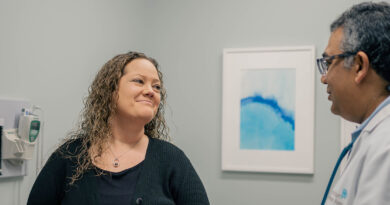Dr. Godwin Ofikwu Discusses What Causes Colon Cancer
According to the American Cancer Society, and American Society of Colon and Rectal Surgeons, colorectal cancer is the third most common cancer diagnosed in the U.S. in both men and women, and is the second leading cause of cancer-related deaths in both men and women. It is projected that 145,600 new colorectal cancer cases have been diagnosed and an estimated 51,020 deaths from colorectal cancer would have occurred in 2019. Despite its regular appearance, the exact cause of colon cancer–as with all cancers–is unknown, but attributable to multifactorial events, says Dr. Godwin Ofikwu. Early detection is the best way to combat colorectal cancer, but it can be hard to detect. It is the great mimicker of symptoms of common conditions, like painless blood in stools attributable to hemorrhoids, abdominal bloating and discomfort attributable to indigestion and or irritable bowel syndrome or black stools to iron supplements.
Colon cancer has many risk factors that increase your chances of developing it. These risk factors include age, family history, genetics, diet, and lifestyle choices, including smoking and alcohol consumption. It’s important to understand these risk factors so you can take the appropriate steps to lower your risk.
1 Age Factor
One of the most common risk factors for colorectal cancer is age. The older you get, the more likely you are to develop this disease. Colon and Rectal cancer most commonly affects people aged 50-75 years old and it’s the third most common type of cancer in America, says Dr. Godwin Ofikwu. As you get older, your chances of getting colon cancer increase dramatically. This is because as you age, your cells divide, but are less likely to be able to repair damage to DNA, which increases the chances of DNA mutations that can lead to colon cancer. However, in recent years, we are seeing a very troubling pattern. While the overall rate of colorectal cancer and the rate among people 50 years and older are on the decrease, likely due to increased risk factor modification, increased screening, and removal of polyps that lead to colon and rectal cancer, the rate is actually on the increase in people 18- to 50-year age group, a unique group of patients. In contrast to overall trends, rectal cancer incidence increased annually in younger adults between 1990 and 2013, and their cancer seems to be more aggressive. We currently do not have a proven explanation for this new pattern, but obesity, physical inactivity, diet, and smoking are high on the suspicion list and there may be other factors that are currently unknown to us among this age group. Hence, people who are younger than 50 years of age should not dismiss painless blood in the stool as just hemorrhoids but should have themselves examined by a colorectal surgeon, as early detection remains the best tool available for cure. The era of thinking of colorectal cancer as a disease of the old may well be behind us for good.
2 Know Your Family History Advises Dr. Godwin Ofikwu
Family history is one of the most common risk factors for colon cancer. If you have a family member who has been diagnosed with this type of cancer, then your chances of developing it are much higher. This risk factor can be mitigated by being aware of your family medical history and asking questions about any cancer diagnoses in your family to get an early diagnosis if needed, by being placed in an appropriate specialized surveillance group for appropriate colonoscopy schedules.
3 Diet and Lifestyle Choices
The American Cancer Society states that diet and lifestyle choices are the second most common risk factor for developing colorectal cancer. Eating large quantities of red meat and processed foods and fat, low in fruits and vegetables, have been linked to colon and Rectal cancer. This may be from inflammation, gut bacteria, and stress on the colon and rectum, explains Dr. Godwin Ofikwu.
Instead, try eating plenty of veggies and fruits that are high in fiber. Whole grains and lean meat are also good for your colon health.
Alcohol consumption is another major risk factor, according to Mayo Clinic. Drinking alcohol increases your chances of developing colon cancer because it can lead to inflammation, which may increase the production of substances that promote abnormal cell growth.
Inactivity linked to too much TV time, video games and other vices that keep you immobile leads more people to a sedentary lifestyle, obesity, and predisposition to colon and rectal cancer.
4 Smoking
Smoking is the number one risk factor for colon cancer–it increases your chances of developing the disease by 30%, warns Dr. Godwin Ofikwu. It can also cause other cancers, like lung cancer, and heart disease. Smoking causes your cells to divide faster than they should, which can cause damage to your DNA. When you’re younger your cells are more resilient and can repair themselves but as you get older your cells become less able to fix themselves.
Smoking puts a strain on the lungs and damages them over time. This means that people who smoke have a higher chance of developing lung cancer. Smoking in combination with other risk factors like genetics or hereditary conditions may have a synergistic effect, giving you a greater chance of developing colon and rectal cancer.




